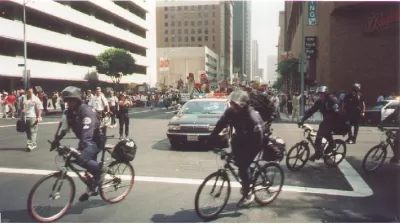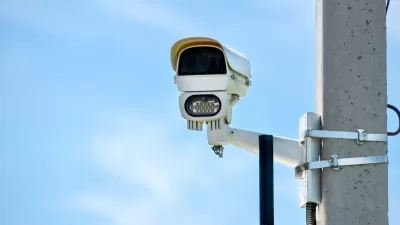As a leading bicycle advocacy organization withdraws support for police enforcement of Vision Zero plans, the discretionary practices of traffic enforcement come under rejuvenated scrutiny.

The Bicycle Coalition of Greater Philadelphia announces that it is adjusting its stance on Vision Zero—the term used to describe the global movement to eliminate traffic fatalities.
Vision Zero is a policy which emphasizes the “5 Es” of planning: engineering, education, encouragement, evaluation, and enforcement. “Enforcement” has always been the most controversial of the Es, and many organizations which focus on safe streets, like the Bicycle Coalition of Greater Philadelphia, have cautiously chalked up armed police enforcement as necessary to save lives.
But that was wrong.
According to the announcement, "armed police enforcement" has negative impacts for public safety, including in the process of reducing collisions on roadways. The announcement comes in response to calls by advocates, like Tamika Butler and Destiny Thomas, calling for a reconsideration of transportation planning innovations given the realities of public safety and policing for BIPOC.
The announcement also follows a newly rejuvenated discussion about the role of enforcement in policing the behavior of motorists. An article by Aaron Gordon ties data about traffic enforcement, to the doctrine police discretion and the public backlash against automated traffic enforcement (i.e., speed and red light cameras).
Gordon writes:
Regardless of which policy you personally prefer, any effort to eliminate racism in American policing must figure out what to do about traffic enforcement, which is the leading cause of interactions between police and the public, according to the Department of Justice. And, by law, it is almost entirely up to the officer whether to let the person go with a warning, give them a ticket, ask to search their vehicle, or escalate the situation even further. It is an interaction intentionally designed to let the officer do virtually whatever he or she wants, reflecting the inherent biases of our legal system.
That discretion favors white drivers, according to data cited by Gordon, which automated systems like speed and red light cameras short-circuit: "Today, we can still see how elemental discretion is to traffic enforcement, because we have an alternative, one many Americans loathe to the bone precisely because it had no discretion: automated enforcement cameras."
FULL STORY: We Are Dropping Police Enforcement From Vision Zero

Planetizen Federal Action Tracker
A weekly monitor of how Trump’s orders and actions are impacting planners and planning in America.

Chicago’s Ghost Rails
Just beneath the surface of the modern city lie the remnants of its expansive early 20th-century streetcar system.

San Antonio and Austin are Fusing Into one Massive Megaregion
The region spanning the two central Texas cities is growing fast, posing challenges for local infrastructure and water supplies.

Since Zion's Shuttles Went Electric “The Smog is Gone”
Visitors to Zion National Park can enjoy the canyon via the nation’s first fully electric park shuttle system.

Trump Distributing DOT Safety Funds at 1/10 Rate of Biden
Funds for Safe Streets and other transportation safety and equity programs are being held up by administrative reviews and conflicts with the Trump administration’s priorities.

German Cities Subsidize Taxis for Women Amid Wave of Violence
Free or low-cost taxi rides can help women navigate cities more safely, but critics say the programs don't address the root causes of violence against women.
Urban Design for Planners 1: Software Tools
This six-course series explores essential urban design concepts using open source software and equips planners with the tools they need to participate fully in the urban design process.
Planning for Universal Design
Learn the tools for implementing Universal Design in planning regulations.
planning NEXT
Appalachian Highlands Housing Partners
Mpact (founded as Rail~Volution)
City of Camden Redevelopment Agency
City of Astoria
City of Portland
City of Laramie





























